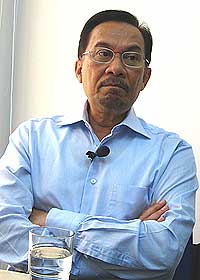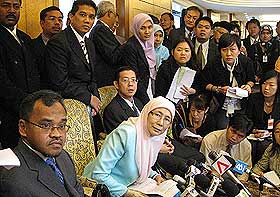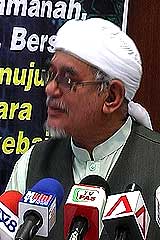De facto PKR leader Anwar Ibrahim has had strong political momentum on his side since the general election in March. He has been a one-man wrecking crew for the opposition and has been responsible for putting the Barisan Nasional on the defensive for the past four months. He captures more headlines – domestically and internationally – than Prime Minister Abdullah Ahmad Badawi. And when the Barisan Nasional captures headlines, it's often been for all the wrong reasons.
Yesterday, Anwar, despite not being an MP or even having a formal leadership position within Pakatan Rakyat, appeared on a nationally-broadcast debate against Information Minister Shabery Cheek. As anticipated, given his oratorical skills and a well-rehearsed message that has been perfected in many stump speeches across the country, Anwar performed with gusto and conviction.
But amidst this seeming surge in momentum, is it possible that Anwar has gone too far in his dogged pursuit of toppling the government? That he has neglected some of his other, arguably more important duties, to the detriment of himself and Pakatan?
 The first thing that comes to mind is Anwar's incessant proclamations that he has enough MPs to cross over to Pakatan's side without being able to produce a single BN MP who has actually crossed over, not withstanding the two Sabah Progressive Party (Sapp) MPs who have signaled their willingness to support a motion of no-confidence in Abdullah.
The first thing that comes to mind is Anwar's incessant proclamations that he has enough MPs to cross over to Pakatan's side without being able to produce a single BN MP who has actually crossed over, not withstanding the two Sabah Progressive Party (Sapp) MPs who have signaled their willingness to support a motion of no-confidence in Abdullah.
Political fatigue has already set in on this particular issue. Most people already think that Anwar is using political brinksmanship and is playing a high-stake poker when it comes to the issue of crossovers. Very few people we've spoken to actually think he has the numbers.
By continuing to play this game, Anwar risks losing credibility not only among the man on the street, but perhaps more crucially, he risks losing the trust of BN MPs who are considering the option of crossing over. Why do so when you may be just one of a few who will actually do it?
Where’s the shadow cabinet?
The second thing that comes to mind is Anwar's neglect of his responsibilities within Pakatan. He has totally neglected to build up the institutional capacity of Pakatan as an alternative governing coalition. Where is the shadow cabinet, which is the least a 'government in waiting' is expected to have?
As the 'PM in waiting', it is Anwar's responsibility to form a shadow cabinet. Indeed, only Anwar has the political credibility and capital to make this happen within Pakatan. But with his limited time and political capital, he has decided to go after BN rather than to consolidate the strength of Pakatan and its ability to govern.
 As a newly-formed (or some would say re-formed) coalition, it's almost inevitable that Pakatan would have its share of growing pains and teething problems. Even the BN – arguably the longest-ruling coalition party in contemporary world history – needs, and has, institutionalised mechanisms to handle disputes amongst its different component parties. Pakatan has nothing resembling that, with grouses being aired regularly in the media.
As a newly-formed (or some would say re-formed) coalition, it's almost inevitable that Pakatan would have its share of growing pains and teething problems. Even the BN – arguably the longest-ruling coalition party in contemporary world history – needs, and has, institutionalised mechanisms to handle disputes amongst its different component parties. Pakatan has nothing resembling that, with grouses being aired regularly in the media.
Pakatan does not have the equivalent of a BN supreme council or even regular meetings amongst its top leaders. Problems, such as the logging of the water catchment area in Kedah, which might affect water supply to Penang, have been left to the mentris besar of the respective states to resolve. There have also been niggling rumours surrounding the inability of the Selangor state government to function cohesively.
PAS unhappy it’s being ignored
Anwar has been perhaps most negligent in his responsibility of assuaging the fears of PAS leaders that they are equal partners within Pakatan. Rumours of talks between PAS and Umno leaders on Malay unity issues have been recently confirmed by both sides.
What Anwar has perhaps chosen to ignore is that since 1999, when PKR was first established, PAS considered it to be a 'mosquito party'. One has to remember that PAS was the leader of the opposition after the 1999 general election and was in control of two states.
Keadilan, as it was known then, won five parliamentary seats, four of which were in Kelantan's base of Kelantan and Terengganu. Even when PAS experienced an electoral downturn in 2004, they still fared better than the one parliamentary seat which Keadilan won. Even today, with PKR having the most number of parliamentary seats, its grassroots network and strength still pales in comparison with that of PAS.
 Given this history, it is not that surprising that PAS president Abdul Hadi Awang recently emphasised that there was no clear leader with Pakatan, an unmistakable signal that he was not willing to allow PAS to be undermined within Pakatan or to play second fiddle to Anwar. Hadi also emphasised that PAS currently holds the most number of state seats, downplaying the fact that it is only the third largest amongst opposition parties in the parliament.
Given this history, it is not that surprising that PAS president Abdul Hadi Awang recently emphasised that there was no clear leader with Pakatan, an unmistakable signal that he was not willing to allow PAS to be undermined within Pakatan or to play second fiddle to Anwar. Hadi also emphasised that PAS currently holds the most number of state seats, downplaying the fact that it is only the third largest amongst opposition parties in the parliament.
While it might be challenging for Anwar to share the spotlight with Hadi, what he could have done was to institutionalise regular meetings between the top Pakatan leaders which could have given some air-time to Hadi and would give the impression that the three Pakatan parties were equals.
Obviously Anwar – who is not a political novice – feels he has no choice but to pursue the route he's taking.
In part 2 (tomorrow), we will try to put ourselves in Anwar's shoes and speculate the underlying motives for his actions (or inactions) thus far. For now, we can only wonder if Anwar has overextended himself by choosing this path.
ONG KIAN MING is a PhD candidate in political science at Duke University and OON YEOH is a writer and new media analyst. You can listen to both of them discuss this topic in their Realpolitik podcast .

